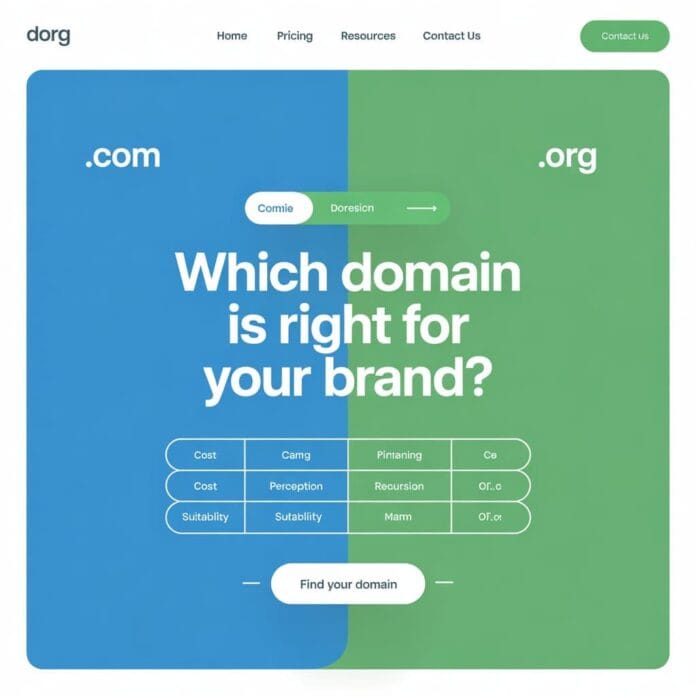Are you trying to decide which domain extension is better and easy, .org or .com?
There are many domain types, but the most of the popular are .org and .com. People often take this lightly, but a site’s best domain extension affects how people view your brand and easy it is for users to find your website.
Want to stay ahead with AI-driven WordPress insights and stay updated with the latest trends? Subscribe for daily search insights at wpguidepro.com to improve your WordPress strategy!
Table of Contents

What are Domain Extensions, and Why Should You Care?
Domain extensions, also called Top-Level Domains, appear after the last dot in a website address.
For Example:
- yourbrand.com
- yourproject.org
TLDs give context about the nature of your website. While .com is often linked to commercial or business sites, .org has historically been associated with nonprofits and community-focused platforms.
Even though anyone can register either TLD today, users still attach different expectations to each.
What is a .org Domain Extension?
The .org domain means ‘organization’ and was originally designed for nonprofits, charities, and educational initiatives. Visitors commonly associate it with trustworthy and cause-driven websites.

Examples:
- Nonprofit foundations
- Educational initiatives
- Open-source software communities
While .org is open to all, it is most effective when your content or mission is related to public service, education, or community work
What is a .com Domain Extension
The .com domain means “commercial” and it was earlier created for businesses and profit-making ventures. Nowadays, it has become the most common and most of the popular domain extension for all types of sites. Be it startups, online stores, or personal blogs, .com is used in all.
Fun Fact: More than 48% of the websites around the world use the .com extension, hence it has become the most recognized and trusted domain extension.
The thing to understand is that if you want to run a company, online store, or blog, the .com extension is most suitable. This domain extension shows people that your website is for some commercial purpose, and due to this they easily visit your website, because everyone finds .com familiar and trustworthy.
Differences Between .org and .com
As we said above, there is no special requirement to register a .org or .com domain. But the actual purpose of both is different and people have different expectations from both.
Now we will understand some major differences between these two in detail:
1. Availability
.com has become so popular that it is quite difficult to get a good domain name with this extension. Many good domains are either already owned by someone or are just parked (without use).
For this reason people look towards other TLDs (Top-Level Domains), like .org.
You can use our free business name generator tool to get started. It will give you smart and unique domain ideas that represent your business in the right way.
Example: If you want to start a recipe blog, you can get a name like wpguidepro.com.
As you can see in the screenshot below, a lot of simple .com domains are already taken.
But there are still a lot of .org domains available. So far about 161.1 million .com domains have been registered, while only 10.6 million are .org.
That’s why .org domains are cheap, while .com domains are getting expensive due to high demand.
2. Credibility and Trustworthiness
The .org extension was originally designed for nonprofit organizations, and is still used by many popular charities and NGOs. That’s why people consider this extension to be more trustworthy.
But, if you are running an online store and your domain ends with .org, people may get confused. They may think it is a donation or mission-driven site, which can increase bounce rates and have SEO impact.
The .com extension looks familiar to people. According to research, .com domains are 33% more memorable, and when people try to remember a URL, they have a 3.8x greater chance of guessing.com.
Also remember, credibility doesn’t depend on the domain extension alone. If the site is using HTTPS, it means the site has SSL encryption – which is secure for user data.
3. Traffic
If you are focusing on your branding and searchability, then .com is the best option. People see .com as the default extension, so it naturally comes to their mind.
Almost 48% of websites use .com, while only 5% use .org.
If your focus is on a nonprofit or social cause, a .org domain can help with SEO, but for a general audience, .com is more effective.
Nowadays smartphones also have a .com shortcut button on the keyboard, which makes typing even easier. Yes, if you long-press that button, you also get options like .org
When Should You Use a .org Extension?
Anyone can register a .org extension, but it’s not the best choice for everyone. Below are some examples of when using .org works best:
- Charity, Community, and Nonprofit Organizations: .org domains are historically associated with nonprofit and humanitarian causes. Internet users also often associate .org with charities and NGOs. If your mission is to help people or work for society, a .org extension can increase your credibility.
- Open-Source Websites: Even if open-source software companies aren’t nonprofits, they often use the .org extension. Its purpose is to show people that their software or community is free and open to all.
- Informational Websites: For websites that provide valuable and unbiased information such as education, health, or social awareness topics the .org domain is perfect for them too.
When Should You Use a .com Extension?
Choosing the best domain extension depends mostly on the type of website you want to build.
Here’s a quick overview of when to use .com:
- Business Websites: .com is a very popular and widely accepted extension, especially for commercial purposes. It’s perfect for almost any kind of for-profit business whether it’s a small business or a startup. People consider .com to be professional and reliable.
- Ecommerce Stores: If you’re running an online store, the .com extension may be trustworthy to shoppers. For example, if a user has a choice between .com and .xyz, he is more likely to purchase from the .com site.
- Blogs and Personal Brands: If you are building a blog or personal brand, .com is easier to remember. This strengthens your branding and helps you reach a wider audience.
Which Extension is Better
If you are running a small business, the .com extension is very useful. The extension also performs well in SEO and boosts your online presence more than other domain alternatives. The extension has become the default choice for people whether it is an online business, personal website, blog or publication. There are billions of websites on the Internet, so it is possible that your desired .com domain is already taken. In such a case, you will have to decide.
Is it right to change your brand name or add extra words just to get .com?
Some people do not change their original idea and choose .org, while some people use .net as an alternative. You can use domain name generator tools like Nameboy. These tools will give you unique and available domain ideas that can be perfect for your business. Since the .com extension also affects your brand and audience perception, it is a best idea to find a suitable .com domain.
How to Use .org or .com Domain Extensions
Domain Name Registrar
- Companies like Domain or Namecheap only sell domains.
- They offer good prices and keep your personal details safe.
Web Hosting Service
- Companies like Bluehost let you buy a domain and give you website space.
- They often give you a free domain for 1 year with their hosting plans.
Website Builder
- Sites like Squarespace let you
- Buy a domain
- Host your site
- Build your website
- All in one place
Step 2: Register Your Domain Name Go to the registrar’s website.
- Use their search tool to find the perfect domain name.
- Make sure it matches your business or idea.
- Create an account and add a payment method.
- Complete the purchase.
Step 3: Choose Web Hosting and a CMS (like WordPress)
- You need a web host to keep your website online.
- Pick a company that gives you space on their server.
- If you want to use WordPress, choose Managed WordPress Hosting.

Example: Bluehost gives you easy WordPress hosting, good for beginners.
Connect your domain name to your hosting account.
Related Guides:
Install Google Analytics: https://wpguidepro.com/install-google-analytics-wordpress/
What’s New in WordPress 6.8: https://wpguidepro.com/whats-new-in-wordpress-6-8/
WordPress Multisite Backup Guide: https://wpguidepro.com/wordpress-multisite-backup-guide-2-methods/
Matomo Analytics WordPress: https://wpguidepro.com/matomo-analytics-wordpress-setup/
Not Secure Website: https://wpguidepro.com/not-secure-website-5-powerful-reasons-to-fix-it-now/


